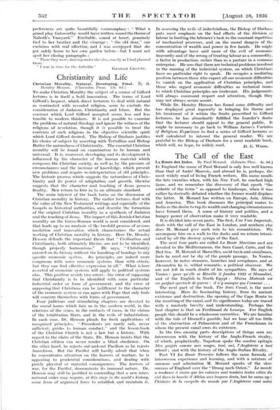Christianity and Life
To make Christian Morality the subject of a course of Gifford lectures is in itself a bold innovation. The terms of Lord Gifford's bequest, which direct lecturers to deal with natural as contrasted with revealed religion, seem to exclude the consideration of Judaism, Christianity and Islam. But the contrast which Lord Gifford accepted seems less and less tenable to modern thinkers. It is not possible to examine the problems of natural theology and ignore the witness of the religions of revelation, though it is possible to treat the contents of such religions in the objective scientific spirit which Lord Gifford desired. The Bishop of Durham justifies his choice of subject by asserting with Tertullian and Bishop Butler the naturalness of Christianity. The essential Christian morality will be found on examination to be human and universal. It is, moreover, developing and its development is influenced by the character of the human material which composes the Christian society, as well as by the pressure of circumstances and the increase of knowledge, which present new problems and require re-interpretation of old principles. The historic process which suggests the naturalness of Chris- tianity and its power of adaptation and growth, likewise suggests that the character and teaching of Jesus possess finality. Men return to him as to an ultimate standard.
The main interest of the book turns on the discussion of Christian morality in history. The earlier lectures deal with the value of the New Testament writings and especially of the Gospels as historical authorities, and describe the formation of the original Christian morality as a synthesis of Judaism and the teaching of Jesus. The impact of this Jewish-Christian morality on the Greco-Roman world is next considered, and that leads up to an analysis of the twofold process of accom- 'modation and innovation which characterises the actual working of Christian morality in history. Here Dr. Hensley Henson defends the important thesis that " Civilisation and Christianity, both ultimately Divine, are not to be identified, though properly harmonious." He says, Christianity entered on its history without the handicap of bondage to any specific economic system. Its principles are indeed more congruous with some economic systems than with others, but they can find effective expression in all." What is here asserted of economic systems will apply to political systems also. This position avoids two errors—the error of supposing that Christianity is to be identified with some particular industrial order or form of government, and the error of supposing that Christians can be indifferent to the character of the economic system or can agree with Pope that only fools will concern themselves with forms of government.
Four judicious and stimulating chapters are devoted to the moral issues which face us in the modern world, in the relations of the sexes, in the contacts of races, in the claims of the totalitarian State, and in the evils of industrialism. In each case, Dr. Henson pleads for fresh applications of recognised principles. " Precedents are rarely safe, never sufficient, guides to human conduct," and the lesson-book of the Christian Church is not a law but a history. With regard to the claim of the State, Dr. Henson insists that the Christian citizen can never render a blind obedience. On the other hand, he rejects out-and-out Pacifism as he rejects Anarchism. But the Pacifist will hardly admit that when he concentrates attention on the horrors of warfare, he is appealing to prudential considerations, and dealing with purely physical or material consequences. The horrors of war, for the Pacifist, demonstrate its immoral nature. Dr. Henson may still be justified in contending that a new inter- national order may require, at this stage in the world's history, some form of organised force to establish and .maintain it In assessing the evils of industrialism, the Bishop of Durham puts most emphasis on the bad effects of the division of labour in limiting the labourer's task to the constant repetition of mechanical processes, and on. the moral dangers of the concentration of wealth and power in few hands. He might with advantage have said more of the evil of economic insecurity and of the wrong of treating labour as a commodity, a factor in production, rather than as a partner in a common enterprise. He sees that there are technical problems involved in the running of the industrial system, on which Christians have no particular right to speak. He occupies a mediating position between those who expect all our economic difficulties to vanish on the application of Christian principles, and those who regard economic difficulties as technical issues to which Christian principles are irrelevant. His judgements will always command respect and attention, though they may not always secure assent.
While Dr. Hensley Henson has found some difficulty and has displayed great ingenuity in bringing his theme and his treatment of it within the limits prescribed to Gifford lecturers, he has abundantly fulfilled the founder's desire that the lecturer should appeal to the general public. It might be necessary to go back to William James's Varieties of Religious Experience to find a series of Gifford lectures so well calculated to interest the general reader. We arc grateful to the Bishop of Durham for a most readable book,
which will, we hope, be widely read. H. G. WOOD.






































 Previous page
Previous page